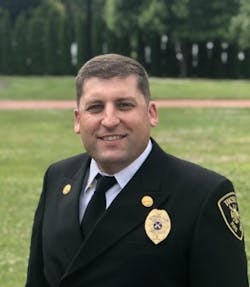Leadership Lessons: Discovering the Emotionally Intelligent Fire Officer
Most fire service careers span decades, and they witness a profession that moves very slowly. Some changes are monumental and spark instant, lasting change, but the fire service is more like a battleship: always moving forward and only able to change course by a few degrees over time and distance. For a needed change in direction, let’s plot a course to discover the value of an emotionally intelligent fire officer.
An emotionally intelligent fire officer pursues the learned behaviors of identifying, clarifying and embracing one’s own emotional experiences and then harnesses that to be empathetic and to develop resonant relationships with others. Emotional intelligence (also known as emotional quotient, or EQ) is arguably the most important quality of a leader, yet it might be the least developed. What about traditional leadership roles and paradigms could the modern fire service learn regarding EQ?
EQ vs. IQ
In most entry-level positions within the fire service, we hire using an evaluative process that involves candidates’ intelligence quotient (IQ). IQ is the tangible ability to solve issues with managing principles, using knowledge, thought and logic. But as people advance through their career, it’s often their EQ that grows, whether recognized or not. EQ provides their ability to develop relationships. The emotionally intelligent leader is self-aware and fosters working environments that provide healthy organizational culture.
To develop EQ requires introspection. On a deeper level, it forces one to embrace and become in tune with his/her emotions. This then transitions into an understanding of how emotions can work in one’s favor. The fire officer becomes responsive, rather than reactive, when faced with emotionally challenging events. Also, understanding the emotions of staff and community builds stronger relationships that inspire loyalty and drive teamwork.
When evaluating personnel for advancement, one of the traditional metrics is evaluating command presence. Command presence often is a dissonant style of leadership, in which the leader is driven by bottom-line outcomes rather than individual and organizational growth and resilience. If applied at the wrong time, command presence can become the sign of a tyrant. On the other hand, when used appropriately, command presence is critical in emergency operations. As fire officer candidates prepare themselves for the testing environment, they are coached and mentored to be able to demonstrate their own command presence. However, considering the fact that much of what we do as leaders and managers occurs away from the fireground, we need to spend an equal amount of time developing our EQ in addition to our command presence.
Where can EQ be found? Research indicates that with focused attention an individual can improve his/her EQ. For example, I never will be to hockey what Wayne Gretzky was; however, if I practice diligently, I could become the best hockey player that I am capable of becoming. So, too, is the case for leadership, particularly in terms of EQ. Becoming in tune with the environment is critical. The sensing that something isn’t right or discordant translates to the fireground and the firehouse. Those felt emotions need to be experienced, developed and exercised.
Where is EQ most valued? There never has been a more important time in the fire service to be an emotionally intelligent leader. The ability for leaders to understand their own tendencies in situations not only helps the emergency scene but the fire station and local community as well. Delivering exceptional care and treatment to fellow firefighters and the first-responder community starts with being self-aware and with recognizing the ability to develop a resonant leadership style that supports the staff mission and values of our organizations. This ensures that we, as emotionally intelligent leaders, are capable of providing the necessary protection, direction and order.
Future fire service officers surely will face challenges that need to be addressed using both IQ and EQ. Officers who become self-aware and emotionally intelligent leaders not only will be in positions of leadership and authority, they will be coveted by subordinates, the organization and the communities that they serve.
About the Author

Kristopher Blume
Kristopher T. Blume is the fire chief of the Meridian, ID, Fire Department and has more than two decades of fire service experience. He is an author, lecturer and independent consultant. Blume is a graduate of the Executive Fire Officer (EFO) program and is an instructor at the National Fire Academy. As a student of the fire service, he is focused on values-driven, mission-focused leadership for the profession. He is the author of "Carry the Fire: The Crucible of Leadership in the Fire Service".
